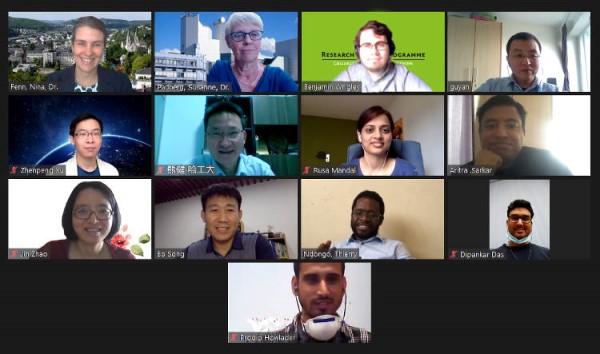On the 18th of June 2020, the Welcome Center and the Alumni Office, together with the Research Alumni Programme, organised a virtual meetup between current and former Humboldtians for them to get to know one another and to share their insights into international research.
The Alexander von Humboldt (AvH) Foundation assists international researchers in undertaking research stays in Germany with an academic host. These AvH scholars, informally known as “Humboldtians”, normally have an excursion each year in which AvH scholars from across Germany come together to network and to share their experiences of international exchange. Due to the ongoing situation with COVID19, this year’s excursion was cancelled. Therefore the Welcome Center of the University of Siegen, together with the Alumni Office and the Research Alumni Programme, decided to organise the very first Siegen Humboldtian Meetup. This meetup was for AvH scholars in Siegen as well as those will come in future for a research visit, to have the chance to meet one another and to hear about the experiences of former AvH scholars in Siegen who are now research alumni. Once Humboldtians have begun their research visit to Siegen, they are invited to join the University of Siegen’s Research Alumni Network in order to stay in touch with one another and the university in future.
Normally such a meetup would have been held face to face, but COVID19 restrictions necessitated an alternative approach. Holding this meeting via Zoom did bring some challenges, but also many positive developments; many research alumni were able to participate despite no longer being in Siegen or having not yet arrived. As a result, the meeting was able to feature researchers from as far away as Cameroon, China and even Darmstadt! The guests came from a wide variety of different academic backgrounds, including technical subjects such as chemistry, physics and mechanical and civil engineering, but also from the humanities, including linguistics.
Choosing a time to suit both Siegen and internationally-based researchers was a challenge. Considering the fact that most of the researchers not currently in Siegen were in Asia, it was decided to have the meeting at 12:30 German time as this would allow those in Germany to attend during their lunch break, whereas those in Asia would be able to attend during the early evening.
To break the ice and to facilitate discussion amongst the researchers, each one was asked about their drink of choice during lunch. Their answers ranged from tea, both green and black, through various types of coffee. One drink enjoyed by many of the researchers outside of work time was one typically German beverage: beer. While they were on the topic of drinks, they also started to talk about food in the Siegerland region, specifically the best places to enjoy cake, ice cream and Chinese food. Nina Fenn from the Welcome Center introduced them to the Siegerland specialty of Reibekuchen (potato bread), which is best enjoyed with some butter and salt.
Once the ice had been broken, discussion turned to their experiences of coming to Siegen to work on their various research projects. There was agreement that, on the whole, Siegen is an optimal place to conduct research because of the supportive environment provided by the university. The city itself was also ideal for focussing on research because it is relatively quiet and close to nature.
With regard to their productivity during the lockdown period, their experiences diverged significantly. For some, being unable to leave the house for non-essential reasons enabled them to focus entirely on their papers which helped them to make progress. Whereas for others, particularly those who had come to Siegen to conduct research using university lab equipment, being unable to work at the university had resulted in them being unable to make as much progress in their research. For many of the researchers who had not had the chance to leave the house for non-essential reasons since March, the opportunity to meet others in a similar situation was invaluable.
When the Humboldtians made their introductions, they discovered many things in common between them, despite none of them having ever met one another before. Some of them were in the same research field, some of the current and former AvH scholars shared the same academic host in Siegen, and two of them even discovered that they were from the same small town in India.
Those who were not in Siegen were able to share their experiences dealing with COVID19 restrictions in their home countries. The virus only reached Cameroon relatively recently and lockdown measures were first enforced a couple of weeks ago. University lectures there are now taking place online in a similar manner to what previously happened in Germany. However in China the restrictions have, for the most part, been lifted, although everyone remains cautious about preventing a second outbreak.
The meeting was a great success. It was agreed by the organisers and guests that, even once everyone is able to meet face to face again, more online meetings should take place in the future. Doing so allows for interactions and the exchange of ideas to take place amongst people all across the world.
